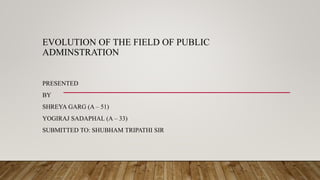
Presentation on PA.pptx
- 1. EVOLUTION OF THE FIELD OF PUBLIC ADMINSTRATION PRESENTED BY SHREYA GARG (A – 51) YOGIRAJ SADAPHAL (A – 33) SUBMITTED TO: SHUBHAM TRIPATHI SIR
- 2. EVOLUTION OF THE FIELD OF PUBLIC ADMINSTRATION • A. Traditional and modern phase: • B. The different field of public administration; • C. Selected major ongoing concerns of public adminstration in the Philippines (reorganization, decentralization and corruption). • D. Home grown governance paradigm (Gowad Kalinga) as one that illustrates successful cooperation between government, business and civil society in the delivery of basic services, which after all is a core concern of modern public administration and good governace . • E. For whom is public administration.
- 3. EVOLUTION OF THE FIELD OF PUBLIC ADMINSTRATION • To retrace the history and evolution of the broad discipline and examine the various strands and influences that have influenced the theory and practice – the praxis – of public administration in the Philippines. • To examine the specific areas and fields of specialization of the field, taking cognizance of the many other emerging fields going beyond the traditional fields of public administration.
- 4. PHASES IN THE EVOLUTION OF PUBLIC ADMINSTRATION • Phase Indicative Period • Traditional / Classical Public Adminstration 1800s to 1950s • Modern Public Adminstration 1950 to the present • Development Adminstration (1950s to 1960s) • New Public Adminstration (1970s) • New Public Adminstration (1980s to 1990s) • Reinventing Government (1990s)
- 5. TRADITIONAL / CLASSICAL PUBLIC ADMINSTRATION • Public Aminstration can be traced back to human history. It has been suggested that it is as old as the ancient empires of China, India, Egypt, Greece, Rome and Mesopotomia. • The institutionalization of administrative capacity for collective purposes is the foundation of public administration. Such arrangement has existed in all societies (Caiden (1982),.
- 6. TRADITIONAL / CLASSICAL PUBLIC ADMINSTRATION • All societies are devoted to advance the general welfare or the public interest. The idea that ‘public administration should not be considered administration of the public but administration for the public’ has been practiced and expessed in the Code of Hammurabi, in Confucianism and in the funeral oration of Pericles. • In other words, the idea of client-oriented public administration has its roots in ancient public administration.
- 7. Caiden (1982) also noted that the genesis of public administration must have had originated from monarcial europe where household officials were divided into two groups: one in charge of public affairs, i.E. The administration of justice, finance, training of armies, and the other is responsible for personal services. Rutgers (1998) supports this claim that administration had already been manifested way back in the mid 17th century and early 18th century in prussia. F.K. Medikus likewise argued on the study of public administration and its position admist the sciences in the 18th century. He advocted “cameralism” and claimed that it should be treated as an autonomous field of study of great importance to the state. Cameral science is designed to prepare potential public officials for government service. This practice flourished in europe until the 21st century but it was, in the long run, replaced by administrative law and legal studies.
- 8. WOODROW WILSON’S 1887 • If the roots of Public Adminstration as a distinct field of study have to be traced, the tendency is to draw on classic essay, “the study of public administration” which was written at the height of progressive movement in the US. It was in that essay that there was a serious claim that public administration should be a self- conscious, professional field. Wilson suggested the distinction between politics and administration i.e. administration should be politics-free and that “the field of administration is the field of business”.
- 9. FRANK GOODNOW (1900) • Frank Goodnow, the “Father of American Public Adminstration”, presented a more meticulous examination of Politics-administration dichotomy in his book, “Politics and Adminstration” that “supplanted the traditional concern with the separation of powers among the various branches of the government” • Politics administration dichotony has provoked lonh-running debates which persist until today. It may be argued though that, as far as the Philippine experience is concerned, the dichotomy is artificial and that in practice, power and partisan politics have had a disproportionate influence upon the workings of public administration in the Philippines.
- 10. MAX WEBER (1946), • A German sociologist who is known as the “Father of Modern Sociology,” made a lucid descriptives analysis of bureaucratic organizations. He presented some major variables or features of bureaucracy such as: hierarchy, division of labor, formally written rules and procedures, impersonality and neutrality; hence, providing a reference point in evaluating both the good abd bad effects of bureaucratic structures.
- 11. THANK YOU